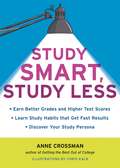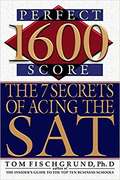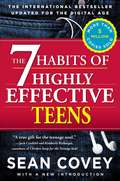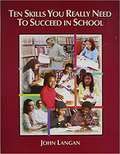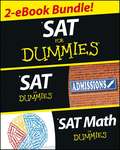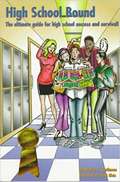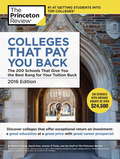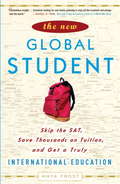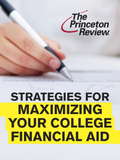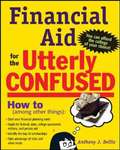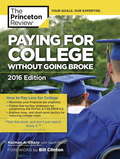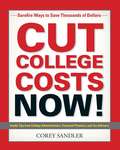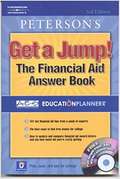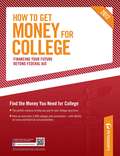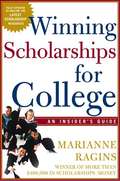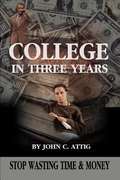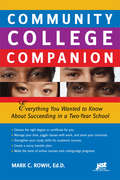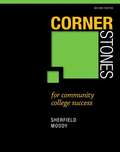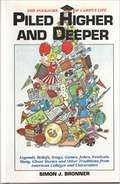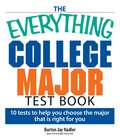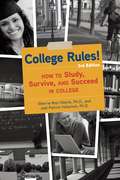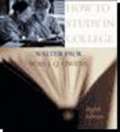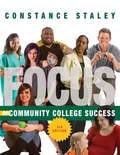Special Collections
Student Resources
- Table View
- List View
Study Smart, Study Less
by Anne CrossmanReap the rewards of a higher GPA without sacrificing your sanity or your social life! If "I studied all night and I still didn't ace the test" is your mantra, this witty study guide will help you pinpoint your personal learning style, prevent study mishaps, and work to your strengths. Using the best research on memory and the brain, Study Smart, Study Less offers easy techniques to help you: * absorb info quickly* remember it accurately* create a successful study space * put together a productive study group * use interactive games to master tough material* identify pitfalls--and avoid falling into them * and stop overstudying (no--this isn't a typo) By learning how to learn, you'll not only feel smarter, you'll be smarter.From the Trade Paperback edition.
1600 Perfect Score
by Tom FischgrundThe author describes the seven qualities that make students who achieve a perfect SAT score stand out. He bases these claims on interviews with students, responses from parents, and College Board data. During his research, Fischgrund asked students about how much time they spend working, reading, watching TV, etc. His conclusions support some of the commonly-accepted thinking about what makes a teen "smart," but he disproves many beliefs as well.
The 7 Habits of Highly Effective Teens
by Sean CoveyWith more than five million copies in print all around the world, The 7 Habits of Highly Effective Teens is the ultimate teenage success guide--now updated for the digital age.Imagine you had a roadmap--a step-by-step guide to help you get from where you are now, to where you want to be in the future. Your goals, your dreams, your plans...they are all within reach. You just need the tools to help you get there. That's what Sean Covey's landmark book, The 7 Habits of Highly Effective Teens, has been to millions of teens: a handbook to self-esteem and success. Now updated for the digital age, this classic book applies the timeless principles of the 7 Habits to the tough issues and life-changing decisions teens face. In an entertaining style, Covey provides a simple approach to help teens improve self-image, build friendships, resist peer pressure, achieve their goals, and get along with their parents, as well as tackle the new challenges of our time, like cyberbullying and social media. In addition, this book is stuffed with cartoons, clever ideas, great quotes, and incredible stories about real teens from all over the world. An indispensable book for teens, as well as parents, teachers, counselors, or any adult who works with teens, The 7 Habits of Highly Effective Teens has become the last word on surviving and thriving as a teen and beyond. "If The 7 Habits of Highly Effective Teens doesn't help you, then you must have a perfect life already."-Jordan McLaughlin, Age 17
Ten Skills You Really Need to Succeed in School
by John LanganA guidebook to the essential skills necessary for students to make the transition from high school to college.
SAT Bundle For Dummies
by Geraldine Woods and Mark Zegarelli and Kristin Josephson and Peter BonfantiTwo complete ebooks for one low price! Created and compiled by the publisher, this SAT bundle brings together two of the bestselling For Dummies SAT guides in one, e-only bundle. With this special bundle, you'll get the complete text of the following titles: SAT For Dummies, 8th Edition Whether you are a student struggling with math, reading, or writing essays, this updated edition of SAT For Dummies offers advice for tackling the toughest questions, as well as hints and tips for making the most of the time available to complete each section. SAT For Dummies is packed with 5 full-length practice tests with detailed answers and explanations, review of foundational concepts for every section, from identifying root words and using commas correctly to solving math word problems and using the quadratic formula. SAT For Dummies gives you the edge you need to successfully achieve the highest score possible! SAT Math For Dummies Scoring well on the mathematics section of the SAT exam isn't guaranteed by getting good grades in Algebra and Geometry. Turn to SAT Math For Dummies for expert advice on translating your classroom success into top scores. Loaded with test-taking strategies, two practice tests, and hundreds of problems with detailed solutions and explanations, SAT Math For Dummies helps you maximize your scores in no time About the Authors of SAT For Dummies, 8th Edition Geraldine Woods has prepared students for the SAT, both academically and emotionally, for the past three decades. She also teaches English and directs the independent-study program at the Horace Mann School in New York City. She is the author of more than 50 books, including English Grammar For Dummies, 2nd Edition; English Grammar Workbook For Dummies, 2nd Edition; Grammar Essentials For Dummies; Research Papers For Dummies; College Admission Essays For Dummies; AP English Literature and AP English Language & Composition For Dummies, all published by Wiley. She lives in New York City with her husband and two parakeets. Peter Bonfanti has taught high school math in New York City since 1996. Before that, he lived in Pennsylvania and was a monk. Before that, he went to school in New Jersey, where he was born and hopes to return someday. Kristin Josephson survived the college admissions process only to drop out of MIT 16 months later to attend circus school in San Francisco. While there, she studied flying trapeze, trampoline, and acrobatics. Kristin discovered her passion for teaching while she was tutoring in the Bay Area, a passion that led her to complete her degree at Colorado College. Kristin eventually landed at the Horace Mann School, where she has been teaching high school mathematics since 2007 About the Author of SAT Math For Dummies Mark Zegarelli holds degrees in math and English from Rutgers University. He is a math tutor and writer with over 25 years of professional experience. Zegarellli has written numerous Dummies books, including LSAT Logic Games For Dummies and Basic Math & Pre-Algebra Workbook For Dummies
High School Bound
by Martin J. SpethmanHIGH SCHOOL BOUND is a fun-filled, entertaining yet practical guide for young people preparing to enter high school. It is filled with over 30 topics of interest from tips on studying, handling peer pressure, cultivating good attitudes, dating, to sports, homework, and much more! Spethman also includes a special section for parents, 12 essential ways to get involved in your high schooler's education.
Colleges That Pay You Back
by Princeton ReviewGet the right return on your college investment with this guide to schools with excellent "Education ROIs": a great education & career prospects at a great price!College is a major financial investment, and one that too many students and parents enter into blindly. The Princeton Review erases that uncertainty with this guide to public and private schools where students get the best return on their tuition investment. That doesn't necessarily mean schools with the lowest price tags, but it does mean schools that give you the best bang for your buck: a combination of great academics with a great price and great experiences--for a great post-college outcome!Colleges That Will Pay You Back.* Our top-value picks--chosen based on 40+ data points, includingacademics, cost of attendance, financial aid, and post-grad salary figures* Profiles of 200 schools that offer a fantastic value, with insight into their careerservices offeringsUnique Ranking Lists.* The top 25 schools with the Best Alumni Network, Best Career Placement,Top Financial Aid, and more* The highest-paying majors and great schools that offer themValuable Career Information from PayScale.com.* Starting and mid-career salary information for graduates of each school* Percentages of alumni who report high job meaning and who majoredin science/technology/engineering/math (STEM) fields
The New Global Student
by Maya FrostGood-bye, Old School. Hello, Bold School!In 2005, Maya Frost and her husband sold everything and left their suburban American lifestyle behind in order to have an adventure abroad. The tricky part: they had to shepherd their four teenage daughters through high school and into college. This hilarious and conspiratorial how-to handbook describes the affordable, accessible, and stunningly advantageous options they stumbled upon that any American student can leverage to get an outrageously relevant global education. Ready to ditch the drama of the traditional hypercompetitive SAT/AP/GPA path? Meet the bold American students who are catapulting into the global economy at twenty with a red-hot college diploma, sizzling 21st-century skills, a blazing sense of direction–and no debt. You’ll discover: • the one thing preventing your student from blasting forward• why Advanced Placement isn’t so advanced• why international programs fail to provide a truly global education• the most critical time for your student to study abroad• the best exchange program in the world ($3,000 or less per year)• the strategic way to fast-forward through high school• how to maximize a family sabbatical • how to live the life of your dreams abroad–and save thousands for collegePacked with myth-busting facts, laughable loopholes, insider insights, astonishing success stories, and poignant tales from the Frost daughters themselves, this inspiring romp is guaranteed to get you cheering.
Strategies for Maximizing Your College Financial Aid
by Princeton Review and Kalman ChanyFiguring out how to pay for college can be daunting. Fortunately, Strategies for Maximizing Your College Financial Aid provides much-needed expert advice for understanding the financial aid process, managing student loans, and getting the most money for college. In this succinct guide, financial aid consultant Kal Chany and the experts at the Princeton Review present a concise but comprehensive overview of college financial aid. Inside, you'll find guidance to demystify the aid process, and information that will help you: · debunk financial aid myths · figure out financial aid terminology · evaluate financial aid packages and awards · understand grants, scholarships, student loans, work-study, and other forms of aid · fill out the FAFSA (Free Application for Federal Student Aid), CSS/PROFILE, and other financial aid forms · choose a college with financial aid in mind · get started on saving for school
Financial Aid for the Utterly Confused
by Anthony J. BelliaYes, you can afford a top-notch college education! You'll want to leave no stone unturned when it comes to paying for a great college education, so get the guide that answers all your questions! Written by a top financial aid pro with 30 years' experience, Financial Aid for the Utterly Confused clues you in on all your financing aid options. And it walks you through the entire process of obtaining the maximum amount to which you may be entitled. You get: Expert guidance on applying for all forms of financial aid; Insider tips on government and private financing, grants, and more; Proven cost-cutting strategies; Sample forms and worksheets; Early financial planning strategies for parents.
Paying for College Without Going Broke, 2014 Edition
by Princeton Review and Kalman ChanyThe only annual college financial aid guide with line-by-line instructions for completing the FAFSA and CSS PROFILE aid forms!As seen in USA TODAY, the Wall Street Journal, Money, and the Los Angeles Times, Paying for College Without Going Broke will help you: * Calculate the actual costs of college * Increase your chances of receiving aid * Compare aid offers and learn how to appeal if needed * Plan strategically as an independent student or divorced or single parent * Understand long- and short-term money-saving tactics * Avoid costly mistakes when applying Paying for College Without Going Broke includes a foreword by Bill Clinton, as well as in-depth line-by-line strategies for filling out 2014-2015 aid forms, including the required federal FAFSA form. The eBook version of this popular guide includes links to downloadable PDFs of the sample forms and worksheets that appear in the book so that you can print them for reference, if desired. (Sample forms and worksheets can be printed directly from devices that support direct printing, or via the desktop app version of your device.)
Cut College Costs Now!
by Corey SandlerDrawing on insider advice from a roundtable of college administrators and financial planners, Cut College Costs NOW! shows you the best ways to manage spending, apply for financial aid, and increase your eligibility for federal, state, and private funding.
Get a Jump! The Financial Aid Answer Book
by Peterson'sProvides information of how to apply for financial aid.
How to Get Money for College 2013
by Peterson'sHow to Get Money for College: Financing Your Future Beyond Federal Aid 2013 is a great resource for anyone looking to supplement his or her federal financial aid package with aid from colleges and universities. This comprehensive directory points the reader to complete and accurate information on need-based and non-need gift aid, loans, work-study, athletic awards, and more. This eBook offers profiles of more than 2,400 schools' financial aid awards, including types of aid, percentages of students applying for and receiving aid, and average aid packages; comprehensive overview of the financial aid process, common financial aid questions, samples of financial aid award letters, and how to file the FAFSA and CSS/Financial Aid PROFILE®.
Winning Scholarships for College
by Marianne RaginsIn this thoroughly revised third edition of Winning Scholarships for College, Marianne Ragins proves that it's not always the students with the best grades or the highest SAT scores who win scholarships. Whether you are in high school, returning to or currently enrolled in college, planning to study abroad, or interested in pursuing an M.B.A., J.D., or M.D., this easy-to-follow guide will show you the path to scholarship success. This is one of the most comprehensive books on winning scholarships available-it reveals where and how to search for funds and takes you step by step through the application process. The third edition includes information on the 2001 education tax breaks, college savings funds, service scholarships, and many new sources of scholarship money. Written from one student to another, Winning Scholarships for College also includes - hundreds of invaluable resources for uncovering scholarship opportunities - information on using the Internet to make your search easier - an in-depth look at how financial aid packages are prepared - foolproof tips for scoring high on the new SAT and ACT - clever suggestions for writing winning personal essays with examples from Ragins's personal scholarship search
College In Three Years
by John C. AttigShows how to complete college in three years using high school, internet, placement tests, correspondence and other resources while avoiding common excessive expenses.
Community College Companion
by Mark C. RowhStudents will explore certificate and degree options; connect their needs, plans, and personalities to courses and programs; and gain tips for enhancing their financial aid package and scoring scholarships.
Cornerstones for Community College Success (Second Edition)
by Robert M. Sherfield and Patricia G. MoodyFor First Year Experience, Student Success, and Introduction to College courses. Written specifically for students attending two year programs, it addresses the needs and challenges of students in community and technical colleges. Cornerstones for Community College Success is known for its concrete and practical strategies that students can apply to all college classes, the world of work, and life in general, it addresses the "why" of learning and the power of positive change. Offers hallmark coverage of Bloom's taxonomy, SQ3R integration, Information and Financial literacy. Major defining topics include first generation students, adult learners, making successful transitions, and planning for success in the second year and beyond. The ancillary materials are designed to assist instructors in delivering a top-level student success course.
Piled Higher and Deeper
by Simon J. BronnerAs suggested by the subtitle, "Legends, Beliefs, Songs, Games, Jokes, Festivals, Slang Ghost Stories and Other Traditions from American Colleges and Universities," Bronner examines every aspect of modern college life. That includes study techniques like mnemonics to help remember complex facts, traditions like waiting times for professors arriving late to class, legendary professors, photocopier art, mooning, streaking, celebrations, pranks, drinking games and songs, fight songs, ghost stories, and competitive college humor (including many Texas Aggie jokes). A section on sororities and fraternities covers rush, pledging, hell week, initiation, and numerous traditions. Even dating, engagement, and slang terms get some coverage. This book will be of greatest interest to those who study folklore and traditions, to new students seeking to learn what to expect in college, and perhaps to those who want to adapt old traditions to their school or its organizations.
The Everything® College Major Test Book
by Burton Jay NadlerWith nearly 40 percent of incoming college freshmen undecided on a major, and with 75 to 80 percent of all students changing their majors at least once during their college career, students are begging for a straightforward guide to help them make the best choice. With 10 tests designed to pinpoint a student's talents, aptitudes, and affinities, The Everything College Major Test Book is the only book out there that makes choosing a major easy--and fun!
College Rules!, 3rd Edition
by Jodi Patrick Holschuh and Sherrie Nist-OlejnikAnd You Thought Getting into College Was Hard... Students who assume they can figure out college on the fly often learn things the hard way--they look back and think, "If only I'd known this from the start!" College Rules! will save you the time and trouble, setting you up for academic success from the get-go. Lesson #1: College is different from high school, and even those who were at the top of their class will need practical advice on how to successfully transition to college life. This updated and expanded third edition of College Rules! reveals strategies that aren't taught in lectures, including how to: Study smarter--not harderPlan a manageable course scheduleMaster e-learning technologiesInteract effectively with profsBecome a research pro--at the library and onlineOrganize killer study groupsFeel engaged--even in "yawn" coursesSurvive the stresses of exam weekSucceed even as an alternative or adult studentSet yourself up for stellar recommendations Saving time, energy, and aggravation by doing everything right the first time will free you up for that pizza break, ultimate frisbee game, or ski trip even quicker. Why? Because College Rules!
How to Study in College
by Walter Pauk and Ross J. Q. Owens8th Edition: Our ultimate goal in this book is to provide you with tools, skills, and systems that will lead to self-sufficiency.
College Success
by Bruce Beiderwell and Linda Tse and Thomas J. Lochhaas and Nicholas B. DekanterCollege Success takes a fresh look at what it means, in today's world, with today's students, to be successful in college. Although many of the topics included--from study skills to personal health, from test-taking to managing time and money--will look familiar to those who have used student success texts that have been around for many editions, College Success takes a new approach. The focus is on realistic, practical tools for the students who need them. This is a book designed, frankly, for students who may have difficulty with traditional college texts. The style is direct and to the point. Information is presented concisely and as simply as possible. This is not a weighty tome that discusses student success--this is a manual for doing it. College student demographics have changed considerably in recent decades. More than a third of all students enroll not directly from high school but after a delay of some years. More students are working and have families. More students come from varied ethnic and cultural backgrounds. More students are the first in their family to attend college. More students have grown up with electronic media and now read and think in ways different from the previous generation. With these and so many other cultural changes, more students are not well prepared for a college education with the study skills and life skills they need to become successful students. For each student to get the most out of College Success and their college experience they must understand who they are as it relates to college. To that end, in every chapter students explore themselves, because success starts with recognizing your own strengths and weaknesses. Students make their own goals based on this self-assessment, determining what success in college really means for them as individuals. Interactive activities then help students learn the choices available to them and the possibilities for improving their skills. Skills are presented in step-by-step processes, tips for success in manageable highlighted displays. Most important, students always see the value of what they are reading--and how they can begin to apply it immediately in their own lives. College Success is intended for use in Freshmen Orientation, Study Skills or Student Success courses. A 2009 study revealed that currently nationwide, 34% of college freshmen do not return to their college for their sophomore year. This book is designed to help change that.
The ABC's of College Planning
by Bernice HornchakThis book is a service project of the New Jersey Association for College Admission Counseling. Its chapters draw on the collective knowledge, experience and expertise of admission and guidance professionals who have helped thousands of high school students make a successful transition to college.
Focus on Community College Success (3rd Edition)
by Constance StaleyFOCUS ON COMMUNITY COLLEGE SUCCESS 3e speaks directly to the community college student, delivering strategies for navigating the unique challenges of juggling school, family, and work, and living/studying at home. Updated with the most current research, this forward-thinking text continues to strive to improve student retention, motivation, and engagement as well as offer proof of student progress and course efficacy through the Entrance and Exit Interviews. The THIRD EDITION includes expanded coverage of multitasking throughout the book with more strategies for helping students reduce distractions and focus on important tasks. A new section on Academic Professionalism defines what it means to be a professional student and shows students how they can build a positive reputation in the classroom. Staley, a leader in the field of motivation, helps students develop realistic expectations of what it takes to learn while encouraging and engaging them with direct applications and immediate results.
